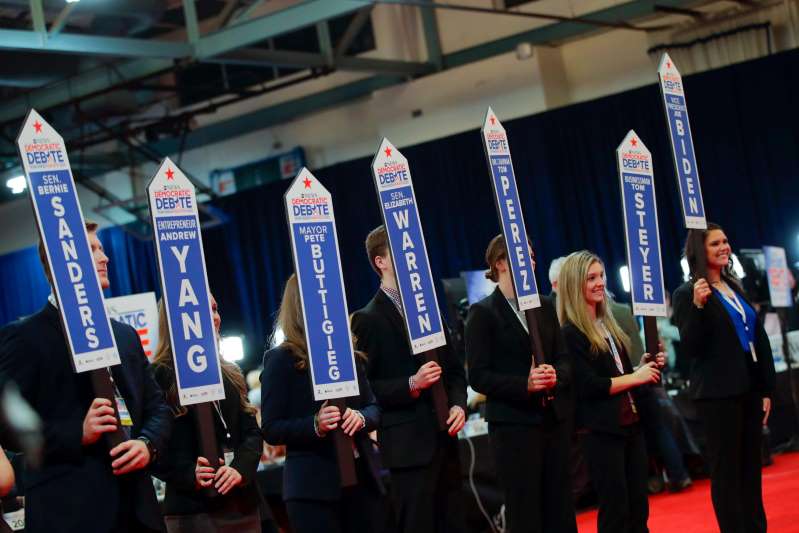By Susan Page, USA TODAY–
It was easy to tell who the new frontrunners are in the Democratic presidential race: The two with the targets on their back.
Pete Buttigieg and Sen. Bernie Sanders finished at the top of the still-not-certified Iowa caucuses on Monday and are now leading in polls for the New Hampshire primary next Tuesday. Not coincidentally, they found themselves the target for everything from their experience (or lack of it) to their history on gun control (Sanders) and their record on race (Buttigieg).
The pace was faster and the attacks were harsher than in the previous debates, perhaps because the stakes have gotten higher as states begin to vote. Not all seven candidates are likely to make it to the debate stage next time. For liberal activist Tom Steyer and entrepreneur Andrew Yang, in particular, it might have been their last chance.
1. Pete Buttigieg was in the crosshairs.
His surge in Iowa, and the momentum it has given him in New Hampshire, made his rivals eager to portray him not as a fresh face but as an inexperienced figure not ready for the White House. “A political newcomer with no record,” Minnesota Sen. Amy Klobuchar said in an unmistakable reference to the former two-term mayor of South Bend, Ind., who just celebrated his 38th birthday.
Buttigieg tried to flip the liability into an asset. He was not “the person with the most years of Washington establishment experience” under his belt, he said – former vice president Joe Biden gave a pained smile at that subtle jibe – but he said the country needed “a perspective that will allow us to leave the politics of the past in the past.”
“The politics of the past were not all bad,” Biden replied.
That said, Buttigieg continued to be on the rise.
The Boston Globe/WBZ/Suffolk University tracking poll in New Hampshire, released about an hour after the debate had ended, showed Buttigieg edging into the narrowest of leads, at 25% over Sanders at 24%. Massachusetts Sen. Elizabeth Warren was third at 14%.The margin of error is +/- 4.4 percentage points.
2. Joe Biden is pleading for more time.
The tracking poll put Biden in a distant fourth, at 11%. In the opening moments of the debate, the former vice president acknowledged a poor showing in Iowa and tried to lower expectations that he might stage a comeback in New Hampshire. “I took a hit in Iowa and I’ll probably take a hit here,” he said.
He argued that the “starting point” was really not just the opening caucuses and primaries but the first four contests, including the Nevada caucuses and the South Carolina primary. Those two states happen to have more diverse electorates that have been friendlier to his appeal.
That said, no candidate in modern times has ever finished as low as fourth in the first two contests and won the nomination, or even survived for much longer.
3. There was a touching moment.
On an evening of fisticuffs, Buttigieg emotionally defended Biden when asked if it was “risky” to nominate Biden, given Republican investigations into him and the work of his son, Hunter, for a Ukrainian gas company.
“We’ve got to draw a line here,” he said. He decried “the kind of president…the kind of human being who would seek to turn someone against his own son.”
Biden looked subdued, even a bit sad.
“We’re not going to let them change the subject,” Buttigieg said.
4. You needed a fight card.
To keep track of whom was attacking who, and why.
Sanders got a fair share. Biden charged that he wasn’t ready to explain how much his Medicare for All health care plan would cost, and he took him to task for past votes against gun control measures.
Sanders attacked Biden for voting to authorize the U.S.-led invasion of Iraq in 2002. (“I made a mistake,” Biden said.) Buttigieg attacked Sanders for insisting on ideological purity. Warren attacked Buttigieg for his record on race as mayor.
Klobuchar portrayed herself as having a record of delivering that Buttigieg lacked, and she described herself as a similarly fresh face.
“I’m 59, and 59 is the new 38,” she said.
5. What about Trump?
During a familiar debate about health care – over the cost and feasibility of Medicare-for-All – Steyer broke in. “The question before us today is how are we going to beat Donald Trump?” he said. “Who can take down Mr. Trump because he’s the real threat to the country.”
He suggested Buttigieg wasn’t up to the job, something Buttigieg countered. With the Democratic nomination far from settled, the contenders were naturally focused more on one another than their general-election foe.
But everyone on stage, and the Democrats in the audience, would surely have agreed with Steyer’s premise, and the argument over who could defeat Trump was the undercurrent of the evening.
“You need to be able to go toe-to-toe with this guy and take him down,” Steyer said, “or we’re going to lose.”
This article originally appeared on USA TODAY: New frontrunners take some punches, but throw them, too: 5 takeaways from the Democratic debate


Leave A Comment
You must be logged in to post a comment.